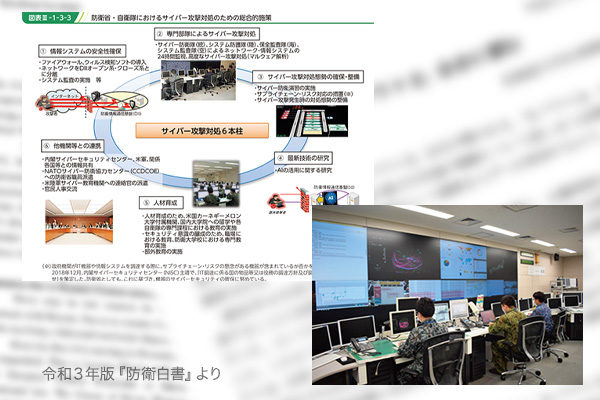A war of words between Japanese political parties is going on in campaigns for the July 10 House of Councilors election. Most parties except the Japanese Communist Party and the Social Democratic Party seemingly approve defense buildup. But the arguments still remain superficial, with no party raising a substantial question about if the Japan Self-Defense Forces(JSDF)can fight modern warfare.
Failing to fight cyber warfare
Modern warfare covers the cyber domain, for instance. In addition to the traditional ground, maritime and air war domains, modern warfare includes new domains such as outer space, cyber and electromagnetic waves. Cyberattacks represent not only an effective tool used in the absence of physical destruction but also intelligence operations. As cyberattacks are evolving fast, none can win a modern war without achieving a cyberwar victory.
In 2014, the JSDF created a cyber warfare unit. But it is designed only to protect the JSDF from cyberattacks. It has no mission to defend others. However, it is little known that the JSDF are not fully ready to defend even themselves.
It is international common sense that any country immediately counters a cyberattack irrespective of whether it is in peacetime or wartime or whether there is physical damage or not. If attacked, a country may intrude into enemy networks or servers to attribute a specific source to the attack and take countermeasures to deter further attacks. This is called “active defense,” representing a starting point of cyber warfare. But the JSDF cannot implement such active defense under Japan’s “exclusively defensive policy” and because of the privacy of communications guaranteed by the constitution.
There is no international law or international treaty that regulates cyber warfare. As senior U.S. officials say there is no international consensus that international customary law prohibits cyberattacks that fall short of intervention in internal affairs or armed attacks. Accordingly, other countries’ responses to cyberattacks are unlimited. The JSDF alone are left unable even to attribute a source to a cyberattack.
Constrains of exclusively defensive policy
On the JSDF’s responses to cyberattacks, then Defense Minister Taro Kono made the following statement in April 2020: “Even in the cyber domain, Japan will maintain the exclusively defensive policy as its premise and continue to comply with relevant domestic and international laws.” He then cited the following cases for the JSDF to be able to counterattack: nuclear reactor meltdown, aircraft crash or dam discharge affecting densely populated regions as the result of hacking into electric power company’s computer networks or air traffic control systems.
Refraining from counterattacks until a meltdown at a nuclear power plant means a defeat in a cyber war. Counterattacks are constrained, however, under the exclusively defensive policy. The government handles cyberattacks in the same way as for armed attacks and plans to launch counterattacks only if cyberattacks cause damage that is as serious as that from physical attacks and are implemented in an organized and planned manner. Under such “Galapagostic” policy, the JSDF cannot protect people. Japan is left behind in modern warfare.
Kunio Orita is a member of the JINF Planning Committee and a special professor at Reitaku University. He is a retired Lieutenant General of the Japan Air Self-Defense Force.


